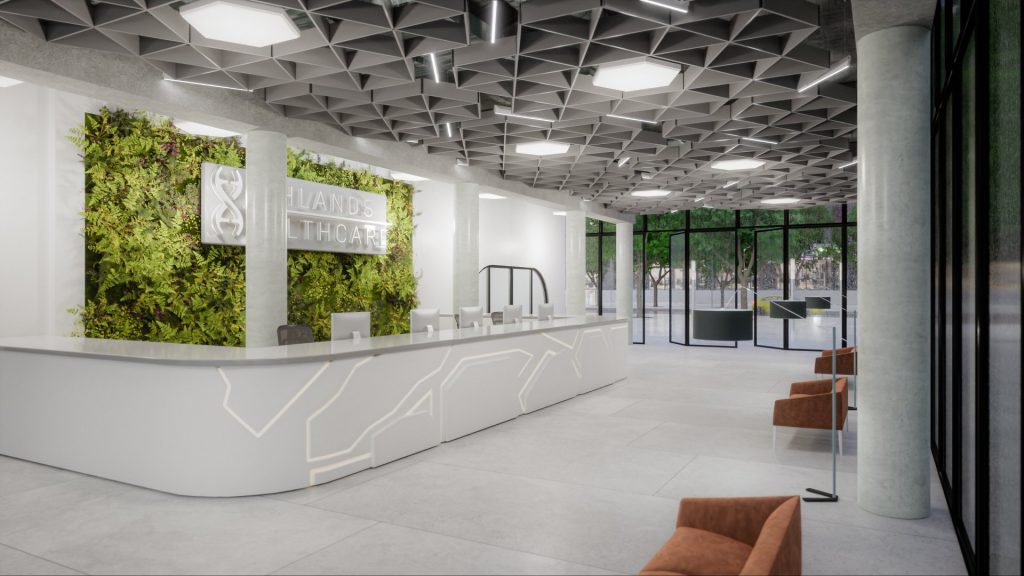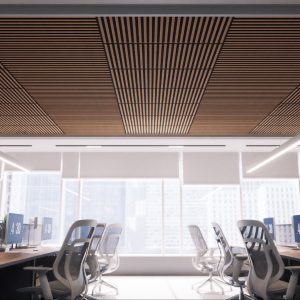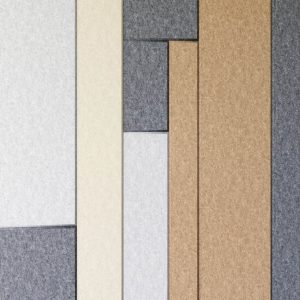Protecting employees’ health and hearing in noisy workplaces requires office noise control measures to be taken. Overly noisy spaces not only harm our health, but they also negatively impact productivity. To combat these ill effects, many workplaces are turning to microperforated aluminum panels and baffles to reduce office noise.
What is Microperforated Aluminum?
Microperforated aluminum panels have exploded in popularity in recent years, due to their unique combination of aesthetic and acoustic benefits. These panels may be customized in a variety of classic and contemporary finishes, and are drilled with thousands of tiny holes that allow sound waves to pass through, blocking the return of some of those waves into the room. The incredible acoustical performance of microperforated aluminum panels makes them an incredibly effective and attractive means of office noise control.
Microperforated Aluminum vs Wood Products
There are microperforated wood panel counterparts out there, and these products deliver a slightly different set of benefits than aluminum. While wood products deliver a specific feel that is desirable in certain applications, there are features of aluminum that make it ideal for use in office spaces.
Durability
When it comes to durability, microperforated aluminum outperforms wood products considerably. Wood is more susceptible to moisture, rot, insects, and UV damage than aluminum. This limits the usability of wood in high humidity and outdoor environments.
It also means that the maintenance of wood panels is more involved, since they must be refinished or resealed periodically to preserve their appearance and durability. In high traffic areas like office spaces, microperforated aluminum is durable enough to resist damage and last for years to come.
Acoustic Performance
If you are serious about improving the quality and reducing the quantity of the sound in your space, your office facade needs noise dampening ability. Microperforated wood provides this through its material composition, but microperforated aluminum with an overhead air gap often works as well or better than wood products for office noise control. While microperforated wood is certainly known as one of the more desirable acoustical materials out there, you likely will not see a noticeable improvement over the performance of microperforated aluminum.
Aesthetic Flexibility
While wood is a classic design element that provides incredible variety through the species we choose, microperforated aluminum offers more flexibility in modern interior design aesthetic that so many businesses have shifted to in recent years. Whether using them as wall panels or ceiling tiles, aluminum is available in multiple different types of finishes to match your desired design aesthetic. If you prefer the look of wood, you can even choose a wood grain finish that will provide the specific look you’re after.
Why Choose Aluminum Panels for Office Noise Control?
Microperforated aluminum panels are ideal for use in office spaces due to their combined aesthetic and acoustic benefits. They look great, and maybe even more importantly, they help with noise reduction in office spaces through their unique design.
Why Office Noise Control is So Important
Occupational noise has led to health and hearing problems for workers all over the world. When we are exposed to overly loud sounds for extended periods, it negatively affects both our physical and emotional health.
The physical aspect is most immediately apparent. If the sounds are incredibly loud, such as with jet engines or gunshots, hearing damage can be inflicted instantaneously. When sounds are not quite so loud, they will still do damage, but that damage is done over time.
Chronic exposure to unwanted noise can affect our mental alertness as well. If you have ever been driven mad by the sound of a clicking pen or popping gum, you already understand the impact that noise can have on your concentration and focus. In the workplace, this can translate into missed deadlines and substandard work.
Utilizing a combination of acoustical noise control solutions and soundproofing in offices keeps employees happier and healthier, and can even increase productivity.
Microperforated Aluminum Panels for Superior Office Aesthetics
As important as it is to protect the health and happiness of our employees, it is also essential that the noise reduction materials we use to accomplish this look great. Microperforated Aluminum is available in multiple clean and contemporary finishes that perfectly accent today’s top decorating trends.
Durability
As we briefly touched on earlier in this article, the incredible durability associated with aluminum products makes them perfect solutions in high traffic areas like office spaces. First, aluminum is not susceptible to things like rot, mildew, or pest damage. This makes it appropriate for use even in high humidity areas and outdoor spaces. It is a truly versatile material that holds up in a wide range of conditions.
Aluminum also doesn’t easily gouge or scratch like softwoods and drywall. This means everyday actions won’t damage the facade in the office. This is a huge benefit, as minor scrapes and scuffs won’t lead to expensive repairs down the line.
Applications of Acoustical Products in Commercial Spaces
There are a lot of places designers like to use aluminum panels in office spaces, due to the specific acoustic and aesthetic needs of those spaces. Here are some areas where aluminum acoustic panels can really improve both.
Offices and Conference Rooms
One of the most popular applications for aluminum panels is individual offices and conference rooms. Each of these spaces can benefit from the added privacy provided by acoustic materials, and the upscale, modern look of aluminum panels makes them look as great as they sound. Echo reduction in office spaces is key to keeping conversations from traveling and keeps information private while reducing the overall volume in the space.
Noise Reduction in Open Office Layouts
Open office areas benefit equally from noise control. By absorbing rather than reflecting sound waves, your walls and ceilings can help control acoustical issues when finished with microperforated aluminum. Here’s how these panels help control sound in open office layouts.
Reducing Echo and Reverberation
When spaces have too many hard, reflective surfaces, sound waves end up bouncing around them and create acoustical issues in the process. The most common of these issues are echo and reverberation.
As most of us know, echoes occur when a sound travels across larger spaces and reflects off of surfaces on the other side. The delayed echo is a result of sound waves bouncing off of those surfaces and returning to the source. As more and more echoes are added into the equation and bounce back and forth, they create reverberation. Reverb both raises the overall volume in indoor spaces and negatively impacts speech intelligibility. Absorbing reflections minimizes both echo and reverberation, reducing overall noise and making communication more effective.
Acoustic Baffles in Open Office Areas
Another popular product in open office spaces is the acoustic baffle. Acoustic baffles are planks that are suspended horizontally along the narrow edge, and drop below the true ceiling to provide amazing acoustic and aesthetic benefits. They naturally help to diffuse sound waves, and they can provide substantial sound absorption that rivals the performance of acoustical sound clouds. This makes them a perfect addition to open office areas.
Noise Barriers
In order to create individual working areas in open office spaces, we often turn to acoustical noise barriers that create separate spaces, both audibly and visually. Things like acoustical partitions and acoustical curtains can be placed to suit your specific needs, and are easy enough to move that a simple rearrangement can deliver a new space when the team grows or needs change.
Maintenance Tips for Aluminum Panels
Proper maintenance is necessary to keep your aluminum panels looking great and providing the acoustic benefits you expect. Luckily, it’s not that hard to keep them in tip top shape. Here are a few tips for properly maintaining your aluminum panels.
Clean them Periodically
Keeping your panels free from debris is one of the easiest and most effective ways to keep your aluminum acoustic panels looking and functioning as they should. Most debris can be removed by a clean, soft cloth. Simply wipe away the debris when you notice it building up. For debris that is not easily removed with a dry cloth, add a little water to the equation. This is sufficient for most spills or muddy debris.
Fix Problems Promptly
If you notice any damage that cannot be wiped off, make sure to fix those panels promptly. This will ensure the damage does not spread beyond the affected panels. Aluminum panels can typically be replaced individually, meaning you don’t have to get into any big repair projects and costs can be kept to a minimum.
Work with Professionals
For anything more severe, working with acoustic professionals will ensure you get the fix you need without breaking the bank. Experienced suppliers and installers can help you at every step of the way, from identifying the proper products and placement of your office noise control products to proper maintenance and repair procedures.
If you would like to learn more about your options, reach out to Material LogIQ for a consultation. Our team of acoustical product professionals have decades of experience working with a wide variety of products in all kinds of projects.




